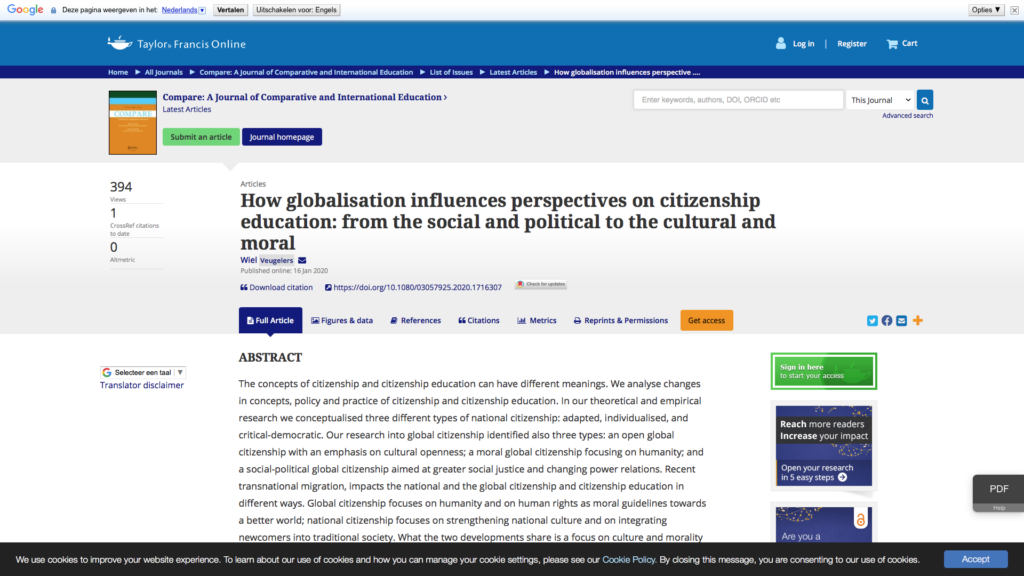Author Archives: admin
Chapter in Handbook Moral and Character Education
Chapter 22, pp 397-399
CITIZENSHIP EDUCATION FOR A DIVERSE EUROPE
Wiel Veugelers
The concept of citizenship education is in Europe widely used in policy, theory, research, and practice. And citizenship development is considered an important task of education. Citi- zenship is the common word used when speaking about the social and political role society expects of the people involved. It’s about the desired identity of its inhabitants. This identity includes moral values, ideas about what a “good life” is and what “the common good” is. These values are materialized in attitudes and desired behavior in social relations and in the political arena.
Each nation has its own ideas about citizenship and citizenship education. These ideas can be very manifest and explicit or can be woven into broader ideologies and political prac- tices. Citizenship can have very different political orientations: it can be democratic, but also authoritarian regimes have a policy and practice of citizenship. In Europe and particularly in the 27 Member States of the European Union democracy is of central value. The history of Europe, and in particular the image Europe likes to give of itself, is a longtime construction and reconstruction of democratic processes, growing attention for human rights, and increased participation of its citizens. Building democracy in Europe itself and exporting democracy to other parts of the world is presented as an important moral drive within modernity and in Western history. Negative aspects of “citizenship development” in Western history in practices of domination, colonialism, and slavery are shrouded by the supposed overall positive processes of building democracy and enforcing humanity in Europe and in the rest of the world.
Response to Hansen
JOURNAL OF MORAL EDUCATION https://doi.org/10.1080/03057240.2024.2384809
The moral and political dimensions of education: Response to Hansen
Wiel Veugelers
Department of Education, University of Humanistic Studies, Utrecht, The Netherlands
KEYWORDS
Moral education; citizenship education; globalisation; humanism; democracy
ABSTRACT
In my book I focus on building a theory about the relationship of moral education and citizenship education in a globalising world and the role of teachers and policy. As Hansen points out, I take a normative stance: enhancing democracy, social justice, a global orientation, and equity in schools and society is the vision that motivates and informs my academic work. Hansen highlights the influence of moral philosophy, psychology and pedagogy on my work; I also try to include sociological perspectives. The most critical point raised by Hansen concerns my treatment of cosmopolitanism. Moral values in global citizenship education can present a horizon and can motivate people. But the political changes need to be realised in practice. Due to recent global, national and psychologi- cal developments, societal and educational processes are becom- ing more complex and—arguing from a critical-democratic perspective—demand education programmes and practices based on reflection, inclusion, dialogue, the appreciation of diver- sity, and deliberation.
Review Book
David Hansen (Colombia University) has written an extended review of my new book in the Journal of Moral Education.
JOURNAL OF MORAL EDUCATION https://doi.org/10.1080/03057240.2024.2384808
EXTENDED BOOK REVIEW
Educational research and the ongoing quest for justice: Review of Wiel Veugelers (2023) Moral and political dimensions of critical-democratic citizenship education: Enhancing social justice, a global orientation, and equity in schools and society. Leiden and Boston: Brill
David T. Hansen
Teachers College, Columbia University, New York, NY, USA
ABSTRACT
In this unique volume, Wiel Veugelers provides a critical overview of research he has undertaken in the field of moral and citizenship education over the past twenty-five years. The watchword is ‘criti- cal’. Veugelers has not simply thrown together a set of previously published works. Rather, he applies a three-part critical lens to each entry, which can be summarized as follows: (1) why he composed the article in the first place, (2) how the article was received in the field, and (3) how the author feels about the article now, especially with respect to its contemporary relevance. This critical perspective helps bring alive the fourteen selected publications, which are divided into six parts whose sequence nicely frames Veugelers’ career research trajectory. In this review, I will touch on each of the six parts and then conclude with several questions his impor- tant research program has bequeathed to the field of moral and citizenship education.
New Book in Bahasa Indonesia
New Book
Moral and Political Dimensions of Critical-Democratic Citizenship Education
Enhancing Social Justice, a Global Orientation, and Equity in Schools and Society
Series: Moral Development and Citizenship Education, Volume: 24
Author:
In Moral and Political Dimensions of Critical-Democratic Citizenship Education, Wiel Veugelers analyses theory, policy and practice of moral education and citizenship education in the past few decades. He shows that there are different orientations in national and global moral education and citizenship education. He criticises the strong orientation on the individual and on adaptation, and argues for more emphasises on social justice, equity and democracy.
This volume brings together articles Veugelers published in the past 25 years. Each article is introduced by a reflection on the reasons for the article, its responses, and lessons that are still relevant. The book ends with a large chapter that overviews central developments and presents a programme for future theory, research, policy and practice in moral education and citizenship education with a strong focus on democracy and empowerment: the moral should become more political and the political more moral.
New articles
Veugelers, W., Bosio, E. Linking moral and social-political perspectives in global citizenship education: A conversation with Wiel Veugelers. Prospects 53, 181–194 (2023).
https://doi.org/10.1007/s11125-021-09576-4
Nimrod Aloni & Wiel Veugelers (2023) Ecohumanism, democratic culture and activist pedagogy: Attending to what the known demands of us, Educational Philosophy and Theory,
DOI: 10.1080/00131857.2023.2295216
New books in book series Moral Development and Citizenship Education
The Brill book series Moral Development and Citizenship has published in 2022 the following 5 books (series-editors Wiel Veugelers and Kirsi Tirri)
Global Citizenship Education in the Global South
Educators’ Perceptions and Practices
Volume: 21
Volume Editors: Emiliano Bosio and Yusef Waghid
Teachers’ Professional Ethics
Theoretical Frameworks and Empirical Research from Finland
Volume: 20
Authors: Kirsi Tirri and Elina Kuusisto
The Challenge of Radicalization and Extremism
Integrating Research on Education and Citizenship in the Context of Migration
Volume: 19
Volume Editors: Eveline Gutzwiller-Helfenfinger, Hermann J. Abs, and Kerstin Göbel
The VaKE Handbook
Theory and Practice of Values and Knowledge Education
Volume: 18
Volume Editors: Sieglinde Weyringer, Jean-Luc Patry, Dimitrios Pnevmatikos, and Frédérique Brossard Børhaug
Activist Pedagogy and Shared Education in Divided Societies
International Perspectives and Next Practices
Volume: 17
Volume Editors: Dafna Yitzhaki, Tony Gallagher, Nimrod Aloni, and Zehavit Gross
https://brill.com/display/serial/MORA
A Moral Perspective on Citizenship Education and ICCS
A chapter in an open access book on ICCS
A Moral Perspective on Citizenship Education and on IEA’s International Civic and Citizenship Education Studies
Pages 291-301
Veugelers, Wiel
https://www.springer.com/gp/book/9783030711016

